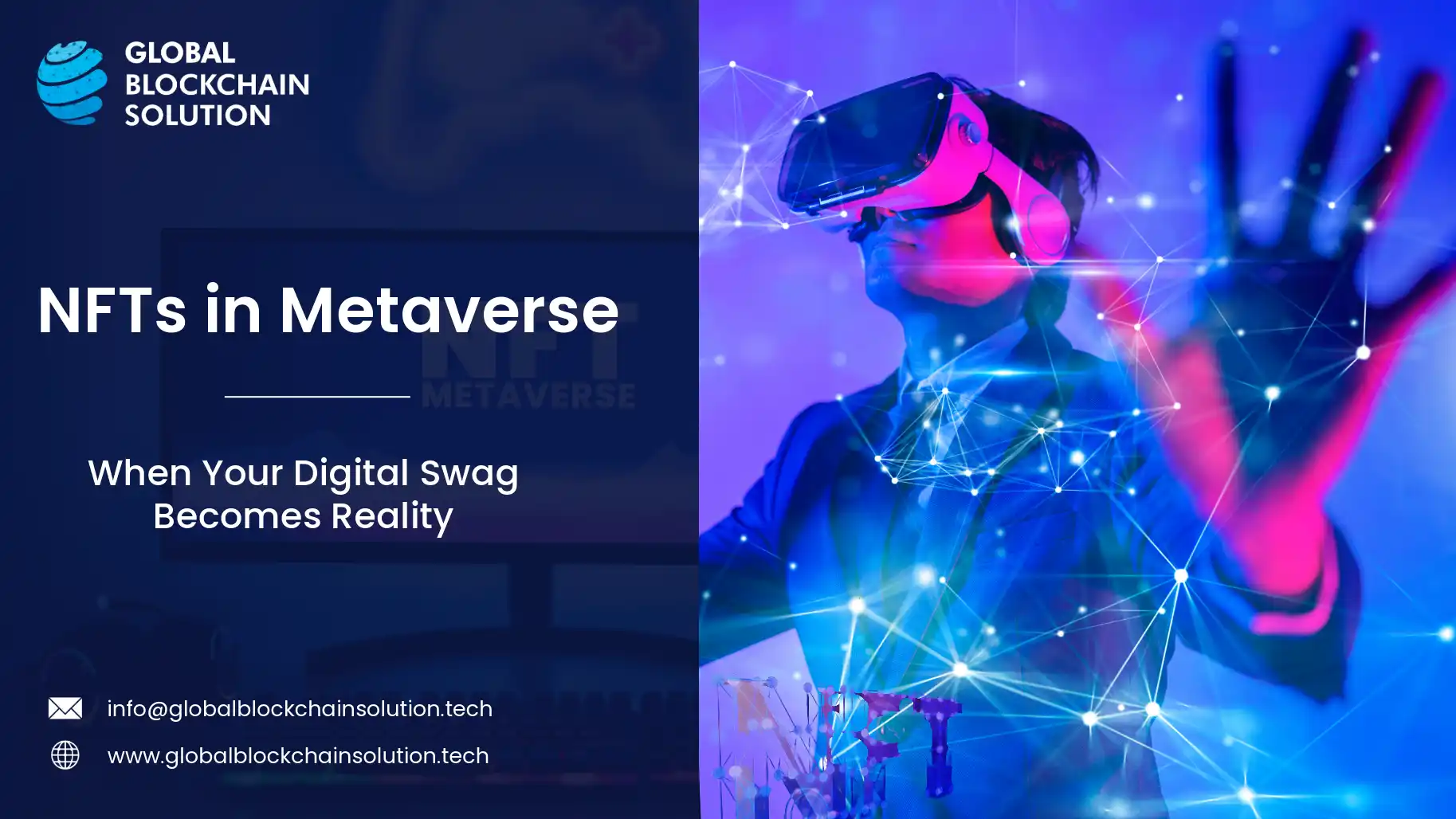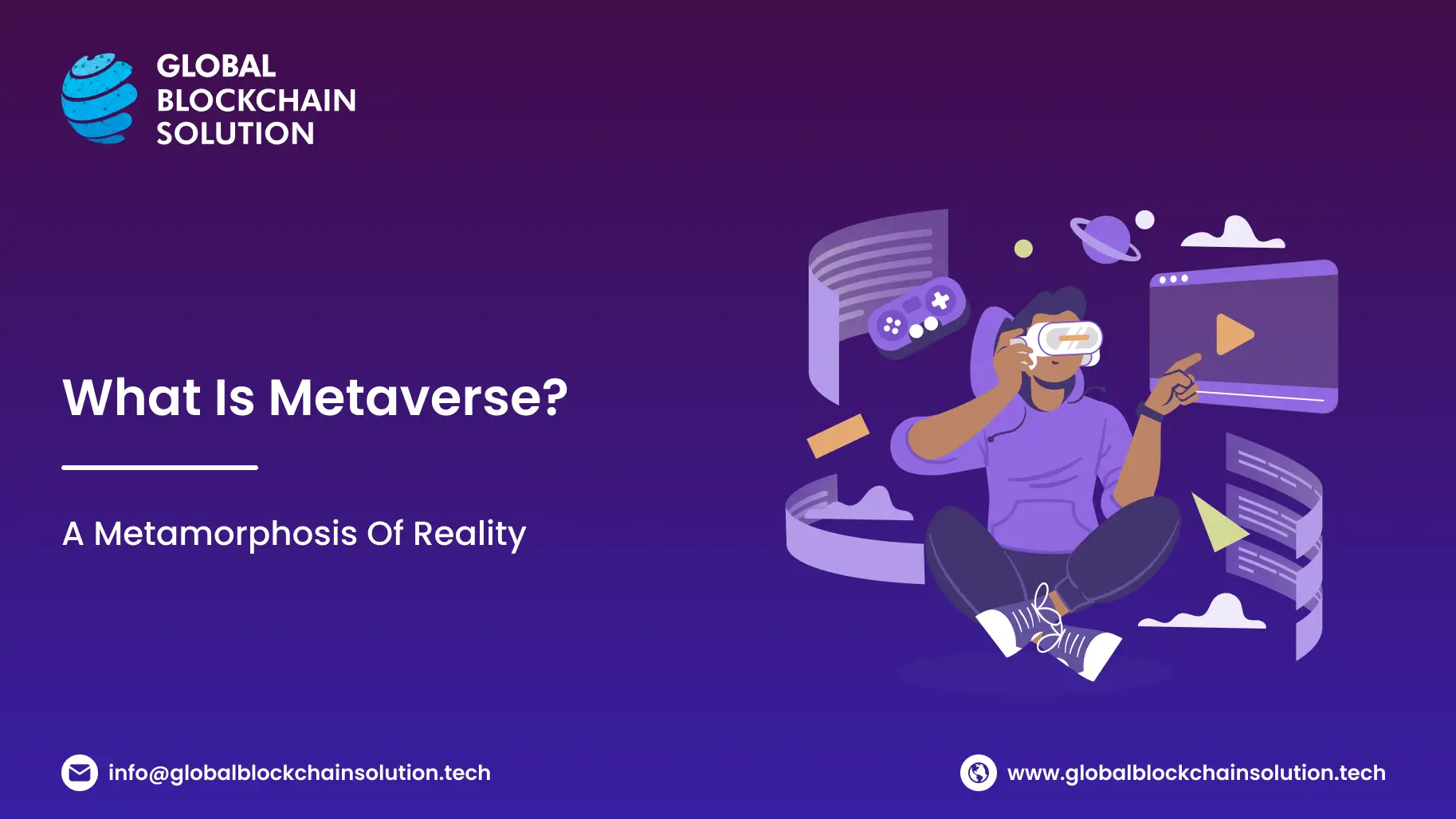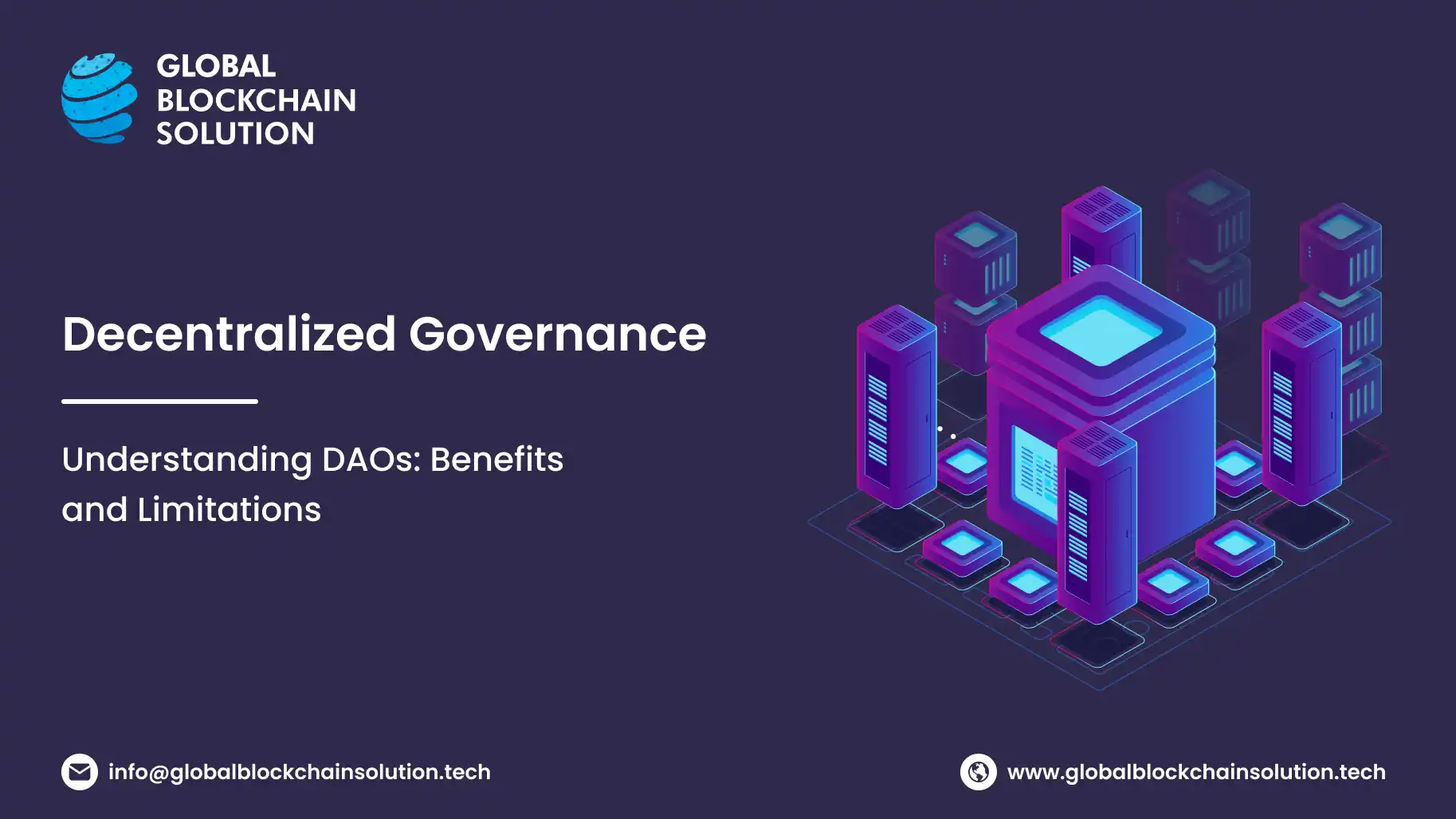Over the past few years, blockchain technology has gained immense popularity, and there is no doubt that it holds a rigid future. With its immutable and decentralized nature, blockchain technology holds the potential to revolutionize different industries. From voting systems to supply chain management, healthcare to finance, blockchain applications have offered innovative solutions for long-standing problems.
Talking about the year 2023, blockchain application development is widely accepted among giants such as IBM, Microsoft, Ford Motors, etc to bring flexibility to day-to-day operations. So here in this guide, we’ll talk about the basics of blockchain technology, the benefits of blockchain applications among different industries, creating a blockchain, blockchain software development, and steps involving steps involving the development of custom blockchain applications.
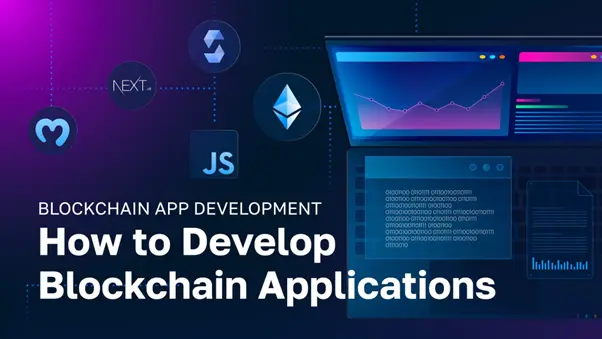
Understanding Blockchain Technology
A blockchain network or technology is a decentralized digital ledger that records digital transactions transparently and securely. Under this ledger, each block of information is linked to the previous block, which is widely distributed across a network of computers, forming an unbreakable chain of networks. This unbreakable chain within the network ensures data integrity and makes it impossible for everyone to alter any data once recorded.
Introduced in 2008 as the underlying technology behind Bitcoin, blockchain technology has evolved effectively and is used by developers to build different applications, including supply chain management, smart contracts, gaming, voting, digital identity management, decentralized finance, and more.
What is Blockchain Development?
Creating a blockchain involves developing, designing, and implementing blockchain technology, i.e., building a distributed and decentralized ledger that stores data and records transactions transparently and securely. Blockchain development, in simple words, involves the creation of smart contracts where buyers and sellers agree on a self-executing term of agreements written into lines of code. Upon admitting the agreements deployments are done on the blockchain network as smart contracts that cannot be altered and are immutable. Thus, offering a high level of transparency and security within the network.
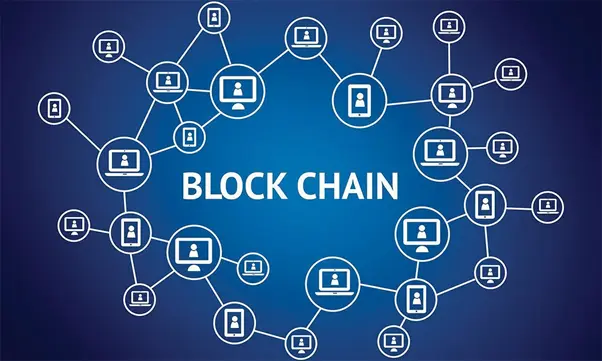
For custom blockchain development different programming languages like Python, Solidity, JavaScript, and Go are used. Nowadays, however, blockchain developers use specialized blockchain platforms such as Hyperledger, Ethereum, and Corda to build decentralized applications (DApps) and blockchain solutions to match the emerging needs of tech giants.
What are DApps or Blockchain Apps?
DApps (decentralized applications) or blockchain apps are software applications that run on a blockchain network eliminating the need for centralized servers. These blockchain apps use self-executing contracts known as smart contracts holding agreement terms of buyers and sellers written directly into lines of code.
Blockchain apps or DApps are immutable, transparent, and open-source contracts where data recorded once on the blockchain network cannot be deleted or altered. Examples of blockchain apps include BitTorrent, voting systems, Tor, cryptocurrency wallets, and decentralized marketplaces, etc. In the past few years, blockchain apps have potentially revolutionized many industries by increasing transparency and security, eliminating intermediaries, and offering users great control over their assets and data.
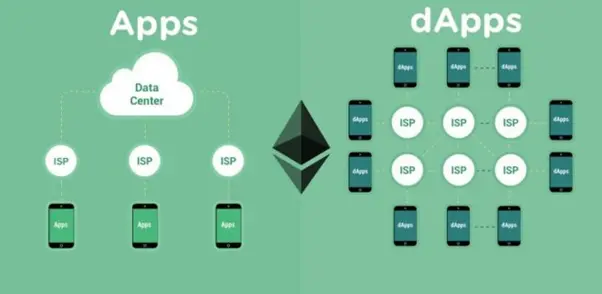
Blockchain apps offer a plethora of benefits that are listed below: -
Security – As every transaction is encrypted and verified by multiple nodes in the blockchain network, there are no chances for anyone to hack or manipulate any data, thereby making the technology secure.
Decentralization – Blockchain technology does not rely on an intermediary or central authority to facilitate transactions. The decentralized nature of the technology ensures that participants can operate autonomously and makes them more resilient to attacks from hackers.
Trust – Blockchain technology is trustworthy and secured as every transaction within the network is verified and recorded by multiple nodes. DApps ensure the elimination of intermediaries to establish trust between parties, thus everyone can trust the system.
Transparency – DApps are inherently transparent as everyone can see what is happening in the system and transactions are tamper-proof.
Efficiency –Since the technology requires zero participation from intermediaries or third-party services to execute transactions, DApps are more efficient than traditional applications. Along with efficiency, the system also speeds up transaction processing times and reduces transaction costs.
How does a blockchain application work?
A blockchain application is a decentralized network that mainly operates on a blockchain network eliminating central ownership. Under a blockchain network, a distributed database is maintained that continuously stores a growing list of records commonly called “blocks.”. These blocks are secured and interlinked with each other using cryptography.
In a blockchain application, mining is used to add transactions to the blockchain network. This mining process involves solving complex mathematical algorithms to add and verify blockchain network transactions. Once a block is created in the blockchain network, it becomes immutable, and data stored under this block cannot be deleted or altered.
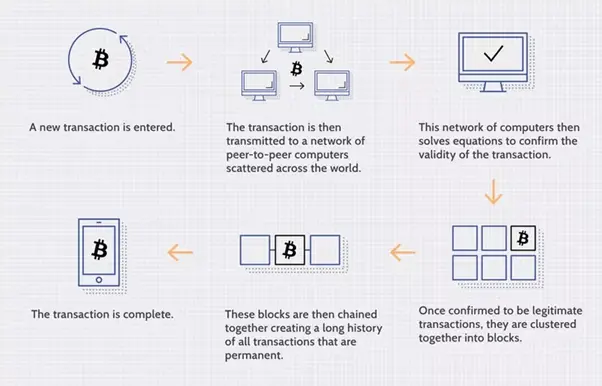
Nowadays, blockchain applications are applicable in industries that require security, transparency, and decentralization. And this can be seen in cryptocurrency transactions, supply chain management, and voting systems.
If someone wants to interact with a blockchain application, they shall use software or a digital wallet to submit transactions to the blockchain network. The network of nodes present on the blockchain then validates the performed transactions by the user. Once the transaction is performed within the network it is added to the blockchain, and the data is stored permanently.
What are the benefits of Blockchain Apps?
Building a blockchain-based application lets users enjoy a plethora of benefits that include: -
Fragmentation- The computing technique used in the blockchain is of distributive nature which prevents it from centralized administration. Therefore, it is mostly used in service industries such as health care, banking, corporate office, etc.
Traceability – The data stored within the network can be traced back to their origin making a record of all transactions accessible to everyone. This feature of blockchain technology can prove handy when there is a need to track or verify the authenticity of products on a large scale.
Receptiveness – The blockchain technology functioning is user-oriented as it provides an ease to the user in terms of workability and does not require any physical approach to perform the operations. It is popular for its API and several other protocols used in its network.
Acknowledgment –The blockchain recognizes the users and doesn’t ask for permission to access the platform. Thus, the blockchain is treated as a transport layer that enables the addition of new applications on the network without any agreement.
Decentralization – The presence of a decentralized network hinders tampering with the data stored within the networks. Also, zero involvement from central authority towards data makes the transactions transparent.
Security – Blockchain technology makes use of cryptography to secure any sort of manipulation of data, making it highly secure. Since data is stored in blocks and each block has a unique hash, it becomes impossible for anyone to tamper with data without getting detected.
Transparency – The technology used within the blockchain applications can be viewed by anyone on the network ensuring no room for corruption as all the transactions are transparent and fair.
Also Read: Top 8 advantages of Blockchain Technology
Challenges of Blockchain Development
Creating a blockchain technology involves challenges that developers may face at the time of its creation. These challenges are listed as follows: -
Scalability: Scalability has been a persistent challenge in blockchain technology. With an increase in users and transactions the blockchain network becomes slow and inefficient.In such cases, developers should find ways to improve blockchain scalability to accommodate growing demand.
Too Much Consumption of Energy: Proof of Work is currently the most commonly utilized consensus algorithm that presents a significant issue due to energy consumption. The excessive energy usage of PoW creates obstacles for regular individuals looking to enter PoW networks while simultaneously incentivizing the formation of large mining pools. As a result, decentralization hinders individuals join these large mining pools while environmental apprehensions continue to hike.
Regulatory Challenges: As blockchain technology continues to gain mainstream adoption, regulatory challenges will likely arise. Developers shall work with governments and regulatory bodies to ensure blockchain networks comply with existing regulations and laws.
Environmental Concerns: The environmental impact of blockchain technology has become an increasingly important issue. In 2023, developers will need to find ways to minimize the carbon footprint of blockchain networks, perhaps by utilizing more eco-friendly consensus mechanisms or increasing the efficiency of mining processes.
User Adoption: While blockchain technology has gained significant attention and interest in the past few years, widespread adoption has been slow. Developers shall focus on improving user experience and creating more user-friendly blockchain applications to increase adoption.
Factors & Languages: Consider for Blockchain Application Development
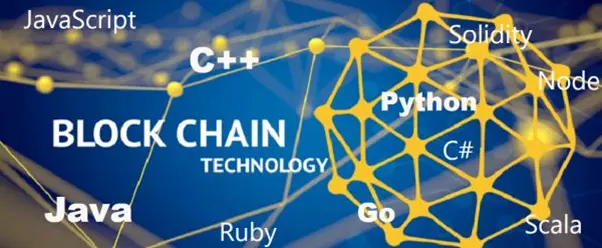
When dealing with the subject matter of developing blockchain applications, there are several programming languages you can consider depending on your needs and preferences. Here are some of the most popular languages used for blockchain application development:
Solidity –Developers use Solidity to write smart contracts on the Ethereum blockchain network. This programming language is used widely by developers on Ethereum-based projects.
JavaScript –JavaScript is another language preferred by programmers worldwide for front and back-end development of blockchain applications.
Python – Python is used by developers if someone wishes to go for custom blockchain development. Many programmers use Python to build blockchain frameworks, dApps, and smart contracts.
Java – Nowadays, Java has gained popularity in the blockchain community as it is used for building enterprise-grade applications.
C++ –Due to its speed and safety, C++ is often regarded as a safer option by programmers for building high-performance blockchain applications.
How to Determine the Right Time to Use Blockchain Development?
Blockchain application development is gaining wide popularity amongst various business setups aware of its potential benefits. But some business setups find it doubtful whether to invest in blockchain as a profound knowledge of the investment options and resources is needed.
Following are some factors to look after when deciding whether or not to use blockchain development:
Complexity: Blockchain technology works on a complex system and needs expertise and ample resources to function well. If any business has the potential to maintain and develop it, then blockchain is a good option.
Security: Blockchain is a perfect fit for those businesses that use sensitive information or high-level security transactions as it considers cryptography to secure data.
Decentralization: A blockchain is a perfect option for those when it comes to performing one-to-one transactions as it works on decentralized technology.
Transparency: If any business entity wants to acquire transparency in its transactions or supply chain, blockchain technology is a perfect fit as all the transactions are recorded on a public ledger.
Steps to build a blockchain solution from scratch?
Building an appropriate blockchain solution is a complex process that requires complete knowledge of blockchain-based languages and experience. Given below are some steps that every programmer/developer needs to follow to build a perfect blockchain solution.
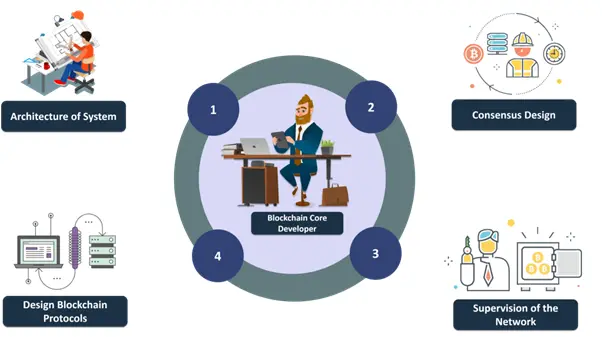
Determining problems to be solved: Every programmer/developer must first look for the kind of problems that they are eyeing to solve with the blockchain solution. It is necessary to figure out at first what they are trying to solve and how the blockchain application will come in handy.
Choosing an appropriate blockchain platform: The blockchain application developer should figure out the strengths and weaknesses of the blockchain platform. The developer can either go for Hyperledger, Ethereum , or Corda depending upon the complexity of the project.
Defining the architecture: The third step involves figuring out the architecture of the blockchain solution once the desired blockchain platform has been chosen. These include the data structure, the network topology, the consensus mechanism, and the smart contract language.
Designing Data Model: Under this step, the developer designs the data model to define the data storage, data type, and data access rules for the blockchain solution.
Developing Smart Contracts: Smart contracts are self-executing programs within the blockchain network built to handle the functionality of the blockchain application. These contracts automatically execute control and take actions on the event as mentioned in an agreement.
Building the network: This step involves supporting the blockchain solution by establishing a suitable network infrastructure. The task of the programmer/developer includes configuring the network, setting up nodes, and ensuring network security.
Testing the solution: A thorough test is necessary before deploying the created blockchain network. Developers can perform that by checking the network infrastructure, the smart contracts, and the overall functionality of the solution.
Deploying the solution: Once the testing phase is complete and satisfactory results are obtained - the developer can deploy the created blockchain application to the real world.
Maintaining and upgrading the solution: To ensure the reliability, security, and scalability of the blockchain solution, it is necessary to maintain and upgrade the solution at regular intervals.
How Can Blockchain Be Used in Various Business Processes?
Here are some ways in which blockchain technology is used in various business processes:
Supply Chain Management: Tracking the products from their genesis point to the point of reaching their final destination blockchain plays a pivotal role, thus ensuring a secure reflection of the process. Not only this, it is used to check the product’s originality and curb any malware merchandise available in the market.
Smart Contracts: Blockchain technology is one of those technologies that has automated generation fundamentals behind its working. The smart contracts that come into the picture maintain the terms and conditions of the agreement on their own.
Digital Identity Management: Blockchain technology keeps the security and privacy of businesses and their customers on an advanced level to decentralize digital identity systems limiting the need for any extra or third-party verification services.
Voting Systems: Blockchain technology helps to maintain the voting systems by setting a transparent image of the elections and voting process, and it has applicability over public referendums, shareholder voting, and board elections.
Banking and Financial Services: Blockchain technology minimizes the role of conciliators such as banks and other financial services, therefore, reducing the charges on the transactions done and leading to speedy work, thus maintaining a decentralized financial system.
Intellectual Property Management: Blockchain technology accredits the originators with fair compensation for their contributions by creating a decentralized intellectual property management system.
Loyalty and Reward Programs: One advantage of blockchain technology is that it doesn’t need any intermediaries, and their cost investments can be saved and used for additional services solely dedicated to customers as rewards, gift cards, and loyalty programs that lead to more and more customer engagement. One fine example is GyftBlock, a collaboration between bitcoin API developer Chain and Gyft that offers digital cards offering secure trade on the public ledger.
Final Thoughts
To ensure rigid growth and success of the business large scale firms like Microsoft, Google, and Amazon keep up with the latest technology innovations and trends. One such trend is blockchain technology which has shown immense growth and offered career opportunities. Nowadays, more and more businesses are considering adopting blockchain-based solutions due to their potential to revolutionize different industries and provide secure & transparent transactions.
However, to appropriately implement blockchain-based solutions, developers with hands-on blockchain software knowledge, its components, and related languages are required to build efficient blockchain applications and networks. Business owners by investing in blockchain can build customized solutions to meet the needs of their clientele and thrive in the ever-evolving digital landscape.
FAQS
1. Can blockchain be used for apps?
Yes, for developing decentralized applications, commonly called DApps. Some examples of blockchain-based apps include Circle, Algorand , Civic , Ligero , Ocular , WholeCare, etc.
2. What language are dApps written in?
DApps (decentralized applications) can be written in various programming languages like Python, JavaScript and HTML, Solidity , Vyper, etc.
3. How much does it cost to build an app on the blockchain?
Building a simple blockchain application might cost the user $10,000 to $40,000, while a more complex one could cost $90,000 to $120,000.
4. What are the applications of blockchain?
Blockchain offers a wide application across different industries like cryptocurrencies and digital assets, healthcare data management, government, travel and hospitality, gaming, IoT, intellectual property protection, identity verification, and authentication.


